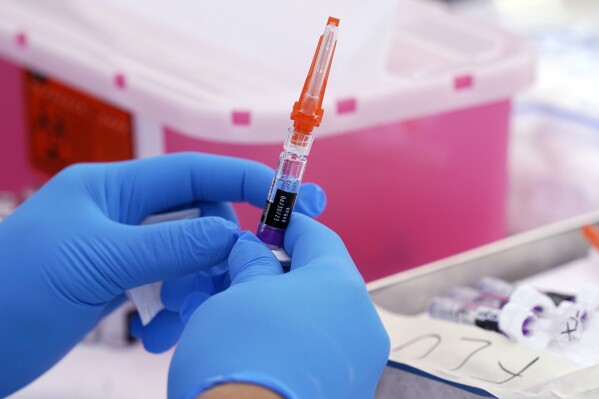[ad_1]
NEW YORK (AP) — More U.S. hospitals are requiring masks and limiting visitors as health officials prepare for an expected but still worsening post-holiday surge in flu, COVID-19 and other illnesses. Have to face.
While many experts say this season likely won’t prove as deadly as some other recent winters, it could still mean hundreds of thousands of hospitalizations and thousands of deaths across the country.
New York City last week made masks mandatory for the city’s 11 public hospitals. Similar measures were ordered last week at some hospitals in Los Angeles and Massachusetts. Anticipating seasonal surges of sick people, some hospitals reinstated masking rules for staff months ago.
Flu and COVID-19 infections have been rising for several weeks, with 31 states reporting high levels of flu-like illness just before Christmas. Updated national numbers are to be released on Friday, but health officials predict infections will rise in many states in January.
“What we’re seeing right now, the first week of January, is a real uptick – especially in flu cases,” said Dr. Mandy Cohen, director of the Centers for Disease Control and Prevention.
There is some good news. Cohen said cases of flu and COVID-19 could peak by the end of the month and then decline. Although flu has been skyrocketing, this year’s cases are being caused by a strain that typically doesn’t cause as many deaths and hospitalizations as some other versions. Additionally, indications suggest that existing flu vaccines are well-matched to this strain.
“I don’t think it’s going to be very high,” said Dr. William Schaffner, an infectious disease expert at Vanderbilt University. He considered the current season to be “moderately serious”.
CDC is pointing the public to an agency Website Where people can see their county, which can help them decide whether to wear a mask or take other precautions. Cohen urged people to get vaccinated and get treatment for flu and COVID-19.
Officials say that vaccination is less this year. According to the most recently available CDC vaccination survey data, about 44% of U.S. adults had received a flu vaccine as of Dec. 23. Only about 19% of U.S. adults were reported to have received an updated COVID-19 shot in early December.
Cases of COVID-19 are causing more severe illness than the flu, but are increasing less dramatically. Health officials are constantly monitoring the evolving new variant of the corona virus, JN.1. The Omicron variant was first detected in the US in September and just before Christmas it was responsible for an estimated 44% of COVID-19 cases.
Health officials say the JN.1 variant may spread easier or better evade our immune systems, but there is no evidence it causes more severe disease than other recent variants . Current evidence indicates that vaccines and antiviral drugs work against it.
The CDC also reported disappointing vaccination rates against another seasonal bug, respiratory syncytial virus, or RSV. This is a common cause of mild cold-like symptoms, but it can be dangerous for infants and older people. According to the latest data, RSV cases increased in the fall, but appear to have leveled off and are even declining in some places.
At Hillsdale Hospital in southern Michigan, a 65% increase in respiratory illness activity in late December limited the number of visitors to the delivery center. Only spouses, support persons and grandparents can visit. All of them should wear masks and should not show symptoms of the disease.
Restrictions are common for hospitals this time of year, said pediatrician Dr. Nicole Ellis, who is the hospital’s medical chief of staff. “But it is more difficult this season,” he said.
“In the past, we had one…disease that we were tracking or monitoring at a time,” Ellis said. “But now, infants and children will have multiple diseases at the same time. “It’s not just that they have RSV…but they’re getting RSV and COVID at the same time, or influenza and RSV at the same time because all those diseases are prevalent in our community.”
,
Kenya Hunter in Atlanta contributed.
,
The Associated Press Health and Science Department receives support from the Howard Hughes Medical Institute’s Science and Educational Media Group and the Robert Wood Johnson Foundation. AP is solely responsible for all content.
[ad_2]
Source link
